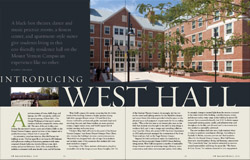Introducing West Hall
A black-box theater, dance and music practice rooms, a fitness center, and apartment-style suites give students living in this eco-friendly residence hall on the Mount Vernon Campus an experience like no other.
Amid mountains of boxes, duffle bags, and laptops, the GW community celebrated the grand opening of West Hall—The George Washington University's newest residence hall and campus life center—this fall. The state-of-the-art facility, overlooking the university's tennis courts and athletics fields on the Mount Vernon Campus, opened its doors in late August and is quickly becoming a vibrant hub of campus life.
An innovative, mixed-use structure, West Hall houses two buildings in one. The four upper floors are home to 288 freshmen and sophomores residing in four-person, apartment-style suites composed of single bedrooms, furnished living rooms, kitchenettes, and private bathrooms. Each of the residential floors includes a communal study area, laundry room, and full kitchen.
West Hall's campus life center, occupying the two lower levels of the building, features a bright, spacious dining hall; fully-equipped fitness center; 150-seat black-box theater outfitted to professional quality standards; high-tech recording, fine arts, and dance studios; six music practice rooms; a digital media room; and 50,000 square feet of student meeting and event space.
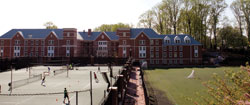
Jessica McConnell
"I believe West Hall will truly be the jewel of the Mount Vernon Campus," says Senior Project Manager Peter Chew, who oversaw the building's two-year construction process. "West Hall was designed with a lot of input from students and includes many of the amenities that students felt were most needed on campus."
According to Mr. Chew, student collaboration played an invaluable role in the design process. Ryan Geraghty, BA '10, of the Student Theater Council, for example, led the way on the sound and lighting systems for the black-box theater and senior Marty MacAlister provided valuable input on the physical space and equipment requirements for the recording studio. "This is the first time in my twenty-plus years in the field that students were brought to the table to help design a residence hall, and it was a unique and rewarding collaboration," says Mr. Chew, who joined GW's Facilities Department in 2002 and previously managed the construction of the Ivory Tower residence hall on the Foggy Bottom Campus.
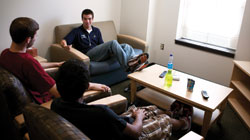
Students lounge in the living room of their apartment-style suite.
William Atkins
Targeted for Gold certification under the Leadership in Energy and Environmental Design (LEED) Green Building rating system, West Hall incorporates a number of sustainable design elements aimed at optimizing energy efficiency, water conservation, and indoor environmental quality. Solar tubes, for example, transport natural light from the exterior courtyard to the lower levels of the building. Low-flow faucets, toilets, and showers reduce water usage in the building by around 40 percent. Environmentally-friendly, low VOC (volatile organic compound)-emitting paints, caulks, and adhesives were used throughout the facility, and all wood used in its construction was certified as sustainably cultivated.
The new residence hall also sets a high standard when it comes to academic enrichment offerings. According to Rachelle S. Heller, associate provost and chief academic officer for the Mount Vernon Campus, West Hall houses three new, interdisciplinary living and learning communities: "The Green Earth Year," for students interested in environmental sustainability and living the green life; "We Serve: A Civic House," for students attracted to civic engagement and public service; and "The Creative and Performing Arts Community," for students passionate about artistic expression and the creative process.
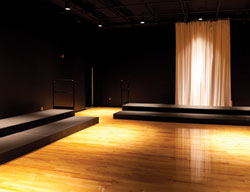
The new residence hall includes a theater for student performances.
William Atkins
"The new building brings a much larger, vibrant community of students to the beautiful Mount Vernon Campus and enhances the academic experience for its residents through these three wonderful living and learning programs," Dr. Heller says.
"Living and learning programs give participants the opportunity to live and engage with students with similar interests, enriching the campus experience for all," says Andrew Goretsky, director of GW Housing Programs. "So often, students focus solely on their majors, and these offerings give them a breadth of knowledge across the disciplines and bring great experiences right to their doors."
Students in the Green Earth living and learning cohort will spend the year examining the technical, business, and social aspects of sustainable living. The program is directed by Melissa Keeley, assistant professor of geography, public policy, and public administration, who resides on the top floor of West Hall (see sidebar). "My research focuses on LEED green building standards in cities, so the opportunity to live in a green residence hall and work with the Green Earth cohort is very exciting," she says.
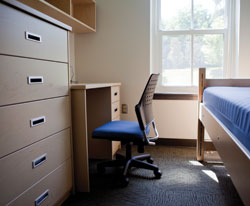
The suites include four single bedrooms.
William Atkins
"For West Hall's Civic House, we've teamed up with GW's Center for Civic Engagement and Public Service to offer students the opportunity to participate in service learning opportunities focusing on education, leadership, and responsibility," Mr. Goretsky says. Civic House students will engage in a variety of service projects, attend cohort meetings featuring guest speakers, and take the lead in planning university public service activities.
Leslie Jacobson, professor of theatre, heads the Creative and Performing Arts Community as faculty mentor. The program, she says, explores all forms and facets of performance and the creative process, using artistic expression as an agent of societal change. "GW students are passionate about making the world a better place," says Professor Jacobson, who was closely involved in the planning and design of West Hall's black-box theater. "Theater and the arts touch people in very profound ways and our living and learning community at West Hall is a great vehicle for helping us address challenges in our society and make a real difference."
Professors Down the Hall
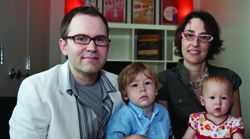
Professors Christopher Klemek and Melissa Keeley and their children, Abraham, 3, and Madeleine, 1.
William Atkins
If you stop in for a quick bite at West Hall's new dining facility, don't be surprised to see professors Melissa Keeley and Christopher Klemek and their kids, Abraham, 3, and Madeleine, 1, at the next table. The family lives on the fourth floor of the sparkling new residence hall—one of four apartments housing faculty members-in-residence at GW.
It's part of a growing trend in academia to promote greater interaction between students and faculty members outside the classroom. This year, four GW faculty members are serving as faculty-in-residence and another nine are working as faculty guides—professors who live off campus but spend many hours a week facilitating dorm-based living-and-learning programs.
"Throughout my career in housing and residential life, I have seen the tremendous benefits of faculty-student engagement programs in the residence halls," says Andrew Goretsky, director of GW Housing Programs. "Since arriving at GW in 2008, one of my goals has been to expand opportunities for students to engage with faculty members in the residence halls through faculty-in-residence, faculty guides, living-and-learning programs, and other initiatives."
According to Mr. Goretsky, GW faculty-in-residence and faculty guides held more than 325 "office hours" in the residence halls last year and hosted more than 200 programs and events for GW residential students—from dinners to guest speakers, book clubs, and museum trips. "Faculty guides and faculty-in-residence provide an opportunity for students to interact with faculty members in an informal setting outside the classroom," he explains. "Studies have shown that when a student regularly engages with faculty outside the classroom, it greatly enriches that student's experience."
Responsibilities of faculty-in-residence and faculty guides range from planning and implementing educational, recreational, social, and cultural programs for students, to serving as role models, mentors, and advisers. Above all, the program strives to provide a seamless transition between the classroom and the residence hall—freeing faculty members from the traditional formalities of the professor-student relationship while strengthening the quality of the GW residential experience.
"The greatest value of the faculty-in-residence program is the close, personal cultivation of student-faculty relationships," says Peter Konwerski, senior associate vice president and dean of students at GW. "While there are a number of ways this can occur on campus, including small, seminar-style classes, undergraduate research opportunities, and service-learning courses, there are few other ways that students can regularly engage in as deep a relationship with a faculty member than in a residential community setting."
According to Rebecca Sawyer, senior assistant dean of students, GW's faculty-in-residence program started with two adjunct faculty members in 1998 and has grown steadily over the past decade. "We are excited about the growth in this program and the ability to provide students the opportunity to interact with faculty members outside of the classroom and right where they live," she says.
"Students who take advantage of this program get to know a faculty member one-on-one and have access to a great resource here at GW," Ms. Sawyer says. "Whether it's an academic-related question, advice on careers, or general information about GW, our faculty-in-residence talk with students in an open and honest way about their experiences and knowledge."
Drs. Keeley and Klemek are a case in point. "We've always believed in breaking down the barriers between our personal and professional lives," says Dr. Klemek, an assistant professor of history, who served as a faculty member-in-residence with his wife for several years at the University of Pennsylvania while pursuing his doctorate. "The kinds of films we like to watch, the kinds of things we like to do in our spare time, are all connected to the kind of scholars that we are, and we're happy to have the chance to share that with our students."
Living in a residence hall was an easy decision for the couple, who met as freshmen at Ohio State University. "We were ballroom dance partners at Ohio State and have been your typical academic couple ever since, living on half a dozen college campuses over the years throughout Europe and North America," Dr. Klemek says. "We've never punched in and out of our personal and professional lives, which makes us ideally suited to be faculty-in-residence."
Dr. Keeley, an assistant professor of geography, public policy and public administration, heads up the Green Earth living and learning program at West Hall. "My recent work focuses on LEED green building standards in cities, so the opportunity to live in a green residence hall and work with the Green Earth cohort is very exciting," says Dr. Keeley, whose research spans urban sustainability, environmental management and land-use planning. "I'm looking forward to bringing my students into my research as active participants and connecting them with environmental professionals I work with throughout Washington."
An expert on the political and intellectual shifts affecting urban policy over the second half of the 20th century, Dr. Klemek plans to share his scholarly interests and fondness for exploring cities with students. "I walk around cities for fun and would be happy for students to join me in exploring various D.C. neighborhoods," says Dr. Klemek, who co-founded Poor Richard's Walking Tours, a Philadelphia-based historical tour company, while working toward his PhD in history.
They both look forward to connecting with students on an informal basis as well. "One of the things we plan on doing as a family is to eat in the dining hall with some regularity," Dr. Keeley says. "We did that at Penn and found that sharing time informally over a meal was a great way to make ourselves available and approachable to our students. It helps demystify the faculty presence a little and adds to the rich and valuable living and learning experience for all of us."
—Jamie L. Freedman

